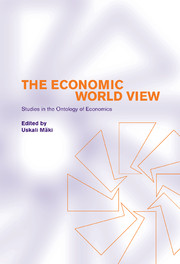Book contents
- Frontmatter
- Contents
- Notes on the contributors
- Preface
- I The what, why, and how of economic ontology
- II Rationality and homo economicus
- Part III Micro, macro, and markets
- Part IV The world of economic causes
- Part V Methodological implications of economic ontology
- 17 Sargent's symmetry saga: ontological versus technical constraints
- 18 Two models of idealization in economics
- 19 The way the world works (www): towards an ontology of theory choice
- Name index
- Subject index
19 - The way the world works (www): towards an ontology of theory choice
Published online by Cambridge University Press: 04 August 2010
- Frontmatter
- Contents
- Notes on the contributors
- Preface
- I The what, why, and how of economic ontology
- II Rationality and homo economicus
- Part III Micro, macro, and markets
- Part IV The world of economic causes
- Part V Methodological implications of economic ontology
- 17 Sargent's symmetry saga: ontological versus technical constraints
- 18 Two models of idealization in economics
- 19 The way the world works (www): towards an ontology of theory choice
- Name index
- Subject index
Summary
Introducing the ontology of theory choice
Economists choose theories and they choose ways of pursuing theories, and they leave others unchosen. Why do economists choose the way they do? How should economists choose? What are the objectives and what are the constraints? What should they be? The questions are both descriptive and prescriptive.
There are two broad classes of “criteria of choice” that have been somewhat systematically considered in the recent literature on economic methodology:
Empirical criteria. There are several possible ways of incorporating empirical criteria in one's theory of science. The respective methodology of theory assessment may be static or dynamic, it may be deductivist or inductivist, it may include various ideas of what constitutes empirical evidence, and so on. What they all share is the general idea that scientific theories are, or are to be, checked against empirical evidence according to some rules, and that this determines the choice of theory.
Social criteria. Again, there are several options. The social criteria may be related to the social interests of scientists or larger social collectives, they may be based on the persuasiveness and tradition-boundedness of theories, they may involve social or moral norms, they may be derived from various costs and benefits of holding a theory in a given research community, and so on. If they involve empirical data, it is the social aspects of the data that matter. What all these views share is that scientific theories are taken to have social attributes (functions, consequences) that play or should play a major role in theory choice.
- Type
- Chapter
- Information
- The Economic World ViewStudies in the Ontology of Economics, pp. 369 - 389Publisher: Cambridge University PressPrint publication year: 2001
- 20
- Cited by



